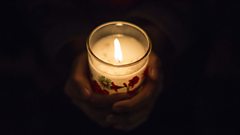Rev Dr Giles Fraser - 31/07/2018
Thought for the Day
Christians should pray for rain, the Anglican Bishop of Europe recently urged after wildfires devastated Greece. Likewise Fire Commissioner Dany Cotton, as she and her crew were battling a blaze on Wanstead Flats last week, confided to a reporter: "I never thought I'd say this but we are praying for rain”.
Why “I never thought I’d say this” ?? – well, I don’t know. But it could be because praying for rain has become almost the epitome of superstitious practise, the sort of thing Victorian anthropologists found amongst what they called primitive peoples. From this perspective, praying for rain is a foolish attempt to manipulate the world with magical rituals or incantations – precisely the sort of thing that science has demonstrated to be laughably pointless. No wonder some might feel a tad embarrassed to be praying for rain, even as a figure of speech.
But I want to defend the practise. Because it’s a complete mistake to think of religion as trying to do what science does better.
Think instead of religion as a sort of training in dependency, as a way of situating us towards that over which we have no control. Understood like this, praying for rain is not some religious way of making it rain, it’s a particularly human way of capturing our powerlessness before the world in which we live - an expression of vulnerability, that we struggle on in a place that does not do our bidding, and to which we therefore cry out with frustration and alarm: “please make it rain”. These words are more expressive than instrumental, not alternative ways of getting something done, but very ancient ways of representing to ourselves our own vulnerability before the devastating forces of nature, of drought and fire.
And there is an important ethic that grows out of all this. First, because a shared experience of fragility is a rich source of human solidarity. But also – and this goes to the question of religion – there is a fundamental decentering that takes place when one appreciates that human flourishing is fundamentally bound up with what is beyond us and beyond our control. Christians call it grace. And it droppeth like the gentle rain from heaven upon the earth beneath.
A common fantasy is that human beings can become self-sufficient, self-sustaining, independent from the world around us, almost like mini-gods. It’s a dangerous fantasy because it says to the world, I have no need of you. That’s why I like the idea of praying for rain. Because our dependence on something as basic as water falling from the sky scoffs at the idea that human beings are in control and can go it alone. This is not some curious primitive explanation. It’s an orientation that connects us to the planet and to each other. The source of life is beyond us.
Duration:
This clip is from
More clips from Thought for the Day
-
![]()
Daniel Greenberg - 14/11/2025
Duration: 02:46
-
![]()
Professor Michael Hurley - 13/11/2025
Duration: 03:05
-
![]()
Rev Roy Jenkins - 12/11/2025
Duration: 03:07
-
![]()
Professor Mona Siddiqui - 11/11/2025
Duration: 02:59






